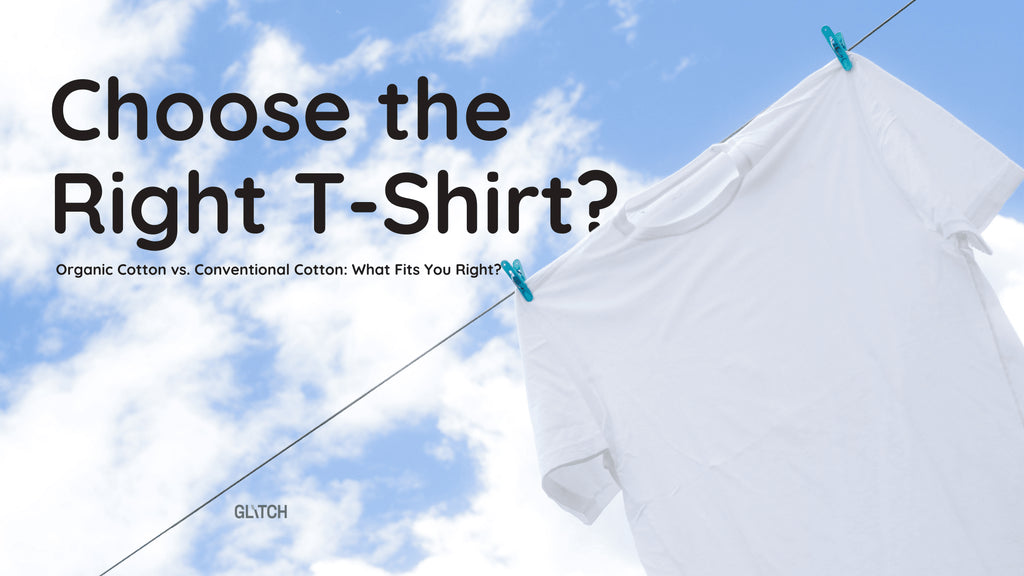Organic Cotton vs. Conventional Cotton: Why Your T-Shirt Choice Matters

In fashion today, your clothes reflect both your values and style. For sustainable shoppers, choosing between organic and conventional cotton matters. This decision affects the environment and farming communities, especially for essentials like T-shirts.
So, what sets organic cotton apart, and why should you care? This article explores its environmental, social, and economic impact.
This article explores the environmental, social, and economic aspects of cotton, helping you make an informed choice.
Starting from The Basics: What is Organic Cotton?

Organic cotton is grown using eco-friendly methods, avoiding toxic chemicals, synthetic pesticides, and GMOs. It follows standards like GOTS and OCS. This process supports soil health, conserves water, and promotes biodiversity.
In contrast, conventional cotton relies heavily on chemical pesticides, fertilizers, and GMOs to maximize yields, often harming the environment. Though it covers only 2.5% of global farmland, it consumes 16% of all insecticides and 6.8% of herbicides, illustrating its intensive chemical use.
1. Environmental Impact: Organic Cotton vs. Conventional Cotton
Environmental Impact, Organic Cotton, Conventional Cotton, Water Consumption- Relies mainly on rainwater, reducing irrigation needs.
- Can reduce water usage by up to 91% compared to conventional cotton (Textile Exchange).
- Requires large amounts of water; a single T-shirt can use up to 2,700 liters.
- High irrigation demands have led to environmental crises, like the drying of the Aral Sea.
- Soil Health- Prioritizes soil health through crop rotation, composting, and cover cropping.
- Enhances soil fertility, moisture retention, and erosion prevention.
- Healthy soil acts as a carbon sink, helping offset emissions.
- Heavy use of synthetic fertilizers and pesticides depletes soil health.
- Soil degradation reduces biodiversity and increases pest susceptibility.
- Creates dependency on chemical inputs, harming long-term soil vitality
- Chemical Usage- Avoids synthetic pesticides and fertilizers, using natural methods like composting and biological pest control.
- Reduces pollution and lowers health risks for farm workers and local communities.
- Relies on synthetic pesticides and fertilizers to boost yields.
- Chemicals leach into soil and water, harming ecosystems and nearby communities.
- Pesticides pose risks to aquatic life, affecting biodiversity and contaminating rivers.
2. Greenhouse Gas Emissions
Organic cotton farming has a smaller carbon footprint than conventional cotton due to its eco-friendly practices, such as avoiding synthetic chemicals, which cuts emissions from chemical production and transport. According to the Textile Exchange, organic cotton can produce up to 46% fewer greenhouse gasses.
In contrast, conventional cotton relies heavily on synthetic fertilizers and machinery, generating higher emissions and intensifying its carbon footprint with energy-intensive practices. For brands aiming to reduce carbon emissions, organic cotton offers a sustainable choice.
3. Social and Economic Impacts
Choosing organic cotton isn’t just about protecting the environment; it also supports ethical labor practices and healthier working conditions. Organic cotton farmers are generally protected from exposure to harmful chemicals, reducing the risk of chronic health conditions linked to pesticide exposure. By choosing organic cotton, consumers can contribute to improved livelihoods for farmers and better working conditions across the cotton supply chain.
In conventional cotton farming, workers often face precarious conditions due to exposure to toxic chemicals and the need to invest in expensive seeds and fertilizers. Conventional cotton production is heavily dependent on GMOs and costly inputs, which can trap small-scale farmers in cycles of debt and poverty.
4. Does Organic Cotton Feel Different? Quality and Comfort
Choosing an organic cotton T-shirt over a conventional one often comes down to quality and comfort. Organic cotton is typically softer and more durable because it’s grown without harsh chemicals, preserving the cotton fibers' strength. As a result, organic T-shirts may feel softer, look better, and last longer.
In contrast, conventional cotton, though usually cheaper, may not provide the same comfort and durability. Chemicals used in its processing can weaken the fibers, leading to shorter lifespans and more frequent replacements, which can increase consumption and waste.
5. Market Trends and Consumer Demand for Organic Cotton
As consumers grow more aware of the environmental impact of their choices, demand for sustainable options like organic cotton is rising. Brands worldwide, from fast fashion to luxury, are adopting sustainable practices to meet this demand. Major companies like Patagonia, Eileen Fisher, and H&M are now integrating organic cotton into their collections, setting an industry-wide trend that promotes more eco-friendly options and encourages others to follow suit.
This shift not only offers consumers greener choices but also drives a broader movement toward sustainability in fashion.
6. How Glitch Supports Sustainable Fashion with Organic Cotton
At Glitch, we are committed to creating fashion that aligns with eco-friendly and ethical practices. By prioritizing organic cotton, we aim to reduce our environmental footprint while offering high-quality thoughtful and colorful products that each customer can feel good about wearing. Every T-shirt produced using organic cotton at Glitch is an effort toward minimizing water consumption, reducing greenhouse gas emissions, and supporting ethical labor practices.
The Verdict: Why Your T-Shirt Choice Matters
So, does choosing an organic cotton T-shirt over a conventional one really make a difference? The answer is a resounding yes!!!!!!!!!
Build a Sustainable Wardrobe with Us!
Building a wardrobe that is both stylish and sustainable starts with conscious decisions. While organic cotton is just one aspect, it plays a key role in minimizing fashion’s ecological and social footprint. At Glitch, we are committed to making this transition effortless by providing premium, eco-friendly options that complement your values and aesthetic.
Every T-shirt, every purchase, and every choice matters. So the next time you shop for a T-shirt, remember that the fabric you choose is more than just a piece of clothing—it’s a statement of a better future.
Choose wisely. Choose consciously. Choose organic. Choose Glitch.

